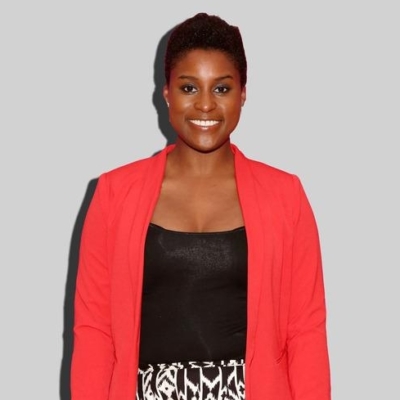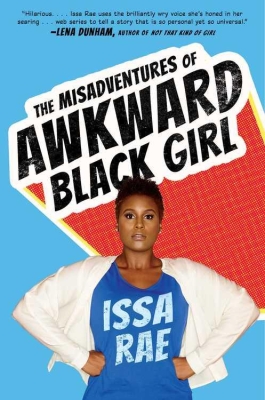If you’re not already familiar with the work of Issa Rae, you’ll want to pay attention. The 30-year-old funny gal, who first made a splash with her hit web series “The Misadventures of Awkward Black Girl” is soon headed to the small screen: HBO has ordered a pilot of Insecure, a comedy about a less-than-perfect modern-day black woman navigating life. Not only that, but her debut book of self-effacing personal essays and musings, also titled The Misadventures of Awkward Black Girl (37 Ink/Atria) has been released earlier this year. Not too shabby for a misfit. We caught up with Rae and asked her what life is like in the awkward lane.
First, how did the idea for the book come about?
I knew I wanted to write something that was fictional but perhaps that had something to do with the series, maybe an extension of it. I had a conversation with Dawn Davis, my editor, and heard some of the questions she had, like “What makes you awkward? Do you have any stories that lead up to that to this moment of you figuring that out?”
I found the book to be very relatable.
I wanted this book to be universal in that way. Just because I’m black doesn’t mean others can’t relate to it.
What do you think your web series resonated with so many people?
I realized the series was reaching a wide audience about halfway through the first season. I was kind of shocked. But everyone is awkward at one point in their lives so I think that was one reason why I think people responded.
In some ways your book seems to be saying “I’m black, so what?”
I think it’s more like, “I’m black, what now? Where do we go from here? Let’s move on.” We could find the things that make us similar and talk about all about the things that make us different but I’m not really interested in that. My message is “I’m black, I can’t change that. And now what?”
Your essay on hair was a particular standout. It’s also loaded with our absurd standards of beauty and why women do damaging things to their hair. Have you finally found a look you like?
My hair’s still short and I like it a lot. I dyed my hair several months ago and I had never done that before in my life. It’s just a lighter brown and it may be my color. I’m down to experiment but I want to be comfortable at the same time. I can be so lazy when it comes to hair. I keep it easy, so I can get up and go.
Another great piece is how you say black women and Asian men are at the “bottom of the dating totem pole” and how they should join forces. Does calling that make you feel self-conscious?
I would [feel self-conscious calling it out] if it weren’t true! [Laughing] Being a black woman I hear how we’re so difficult, and hear how no one wants to date us. And then I hear my friends who are east Asian talk about how they aren’t attracted to men of their own ethnicity. I’m like, “Are you serious?” Since the odds are against us [black women and Asian men], we should unite. I’m being tongue-in-cheek in a way but I think the facts are still there. Blasian relations of the future!
And then there are the heavy essays, like the one about your father’s infidelity and parents’ divorce. Was that difficult to write about knowing that it would be published?
I had never really written out my thoughts on it before, so it was cathartic in a way. It wasn’t until I realized that people were going to eventually read this that I thought, “Oh shit, this is real. I should talk to my family about this.” I asked my mom first if it was okay with her and she was like, “Yes! He did that!” [Laughing] So maybe Mom wasn’t the best person to go to first. I asked my sister to read the essay just to make sure it wasn’t TMI, that I wasn’t being disrespectful and she said, “Eh, you gotta let Dad read it.” I had never even talked to my dad about it and he never knew my feelings on it. There was definitely tension but he was like “There are some things people don’t need to know all the details about, but at the end of the day I’m proud of you and respect your vision. If you need to tell this story, then you need to tell it.”
What other topics were a challenge to write about?
The essay “The Struggle” is such a sensitive topic. People think that I’m trying to run away from my race or I’m trying to “not be that” and that’s not something I want to be labeled as. Cosmo took an excerpt from my book and put it in the magazine in their Black History Month issue, or rather, it just happened to be Black History Month. And I wrote that particular piece three years ago and repurposed it, but some people took it out of context. I had written it pre-Ferguson and pre-Mike Brown. After all that happened, I felt like I was being judged for what was essentially just a public diary entry. Essays that are not necessarily supposed to be funny, or even if they’re supposed to be tongue-in-cheek, being taken out of context is scary to me. This is my life, these are my problems, these are my thoughts, and I’m being judged for them.
What do you hope people take away from your HBO series?
I want my work to resonate with people in some positive way. A girl at a book signing came up to me and said, “Oh. My. God. I thought I was the only 13-year old cyber slut on the internet! My parents sent me to therapy because of it.” Moments like that when I’m connecting to people are what make it worth it. That’s what I aim to do.![]()

